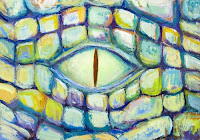Friday, December 19, 2008
Chanukah Sameach!
Chanukah begins this weekend, but instead of lighting candles, I will be driving from Texas to California, helping someone move to Los Angeles. These are happy times, and they are only getting happier...despite the prospect of spending 22 hours on the road. I had hoped to post my virtual menorah again, but I couldn't get it to work this year for some reason. Then again, I suppose it's not really a menorah, but rather a chanukiah.
Saturday, December 06, 2008
Crocodiles and Alligators

I just got back from spending a few days in Texas, and on the flight home I read Aryeh Lev Stollman's collection of stories The Dialogues of Time and Entropy (2003). I have loved Stollman's work ever since I read his novel The Far Euphrates, which I plan to teach in my Ethics and the Holocaust seminar next quarter. His voice is unique, and his narratives are deeply philosophical, scientific, and religious--a strange but alluring combination. Lately, in particular, I am drawn to writers who tell stories that are heavy with loss, but are simultaneously aware of their incapacities to evoke the veryloss they attempt to capture in their work. Stollman does loss in a way that no other writer, to my recollection, does it. Often when I finish one of his stories, I feel a thickness in my chest, an aching of sorts. And I don't know why.
But as much as I love Stollman's work, I don't tend to underline as much as I usually do in works that move me intellectually or spiritually. But there is the occasional one-liner that gets to me in regard to Stollman. In "New Memories," for example, a father tries to show his son the difference between a crocodile and an alligator: "Alexander," he says, "most people can't tell the difference between things. People only see what they know."
When I first read this, I thought to myself, yes, that is true. Certain people in my family, for instance, seem to see only what they have grown up with in regard to the nature of G-d, religion, spirituality, and, of course, politics. But the terrifying moment comes when I realize that I, too, must necessarily have such blindspots.
And yet the so-called quest of the so-called scholar is the pursuit of knowledge and knowing--it's about learning to distinguish the subtle nuances that ripple through every segment of life and living. It's about learning to see the difference between crocodiles and alligators. And I do, in fact, see all those nuances. But what I have come to learn is that often these nuances, and the knowledge they impart to me, are as blinding as the inadequacies that render others inable to see anything other than what they know.
But as much as I love Stollman's work, I don't tend to underline as much as I usually do in works that move me intellectually or spiritually. But there is the occasional one-liner that gets to me in regard to Stollman. In "New Memories," for example, a father tries to show his son the difference between a crocodile and an alligator: "Alexander," he says, "most people can't tell the difference between things. People only see what they know."
When I first read this, I thought to myself, yes, that is true. Certain people in my family, for instance, seem to see only what they have grown up with in regard to the nature of G-d, religion, spirituality, and, of course, politics. But the terrifying moment comes when I realize that I, too, must necessarily have such blindspots.
And yet the so-called quest of the so-called scholar is the pursuit of knowledge and knowing--it's about learning to distinguish the subtle nuances that ripple through every segment of life and living. It's about learning to see the difference between crocodiles and alligators. And I do, in fact, see all those nuances. But what I have come to learn is that often these nuances, and the knowledge they impart to me, are as blinding as the inadequacies that render others inable to see anything other than what they know.
Subscribe to:
Posts (Atom)



